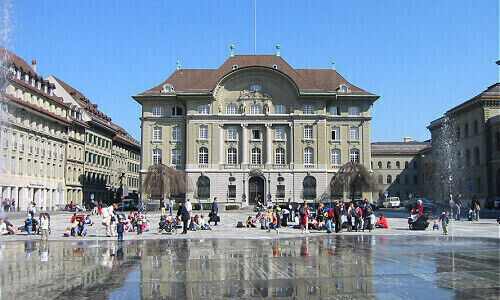Economists are certain the SNB will raise interest rates on Thursday but are divided on the magnitude and whether another hike will follow in September.
Economic conditions in Switzerland remain extremely good by international standards with inflation running at just over 2 percent, low unemployment, and a robust Swiss franc versus the euro and the dollar. It's an enviable position for central bank policymakers to be.
These conditions provide the Swiss National Bank (SNB) the decision-making flexibility to raise key interest rates further, according to economists who disagree over the pace of change, and whether to stop at 1.75 percent or ratchet up further to 2.00 percent.
Above-Target Inflation
The reasons for tightening the monetary policy screws are obvious. Inflation remains above the SNB's target range of zero to two percent, and according to forecasts, inflation could prove to be more stubborn than was thought a few months ago.
Figures from the Federal Statistical Office (FSO) showed annual inflation in Switzerland falling to 2.2 percent in May from 2.6 percent in April, low compared with 6.1 percent in the euro area and Germany, the bloc's largest economy. As recently as early June, SNB President Thomas Jordan had expressed concern about stubbornly high core inflation.
Interest Rates, Currencies, and Yields
The second issue is the interest rate differential between the US and the eurozone. The Federal Reserve Board (Fed) recently paused its series of rake hikes, keeping its rate corridor between 5.00 to 5.25 percent. The ECB jacked up its key rate another 25 basis points last week to 4.00 percent with its eighth consecutive hike, with both leaving the door open to further tightening.
The differential to the Swiss rate of 1.5 percent plays a role above all with the Swiss franc exchange rate, and the SNB currently has no appetite for weakening the franc. The Swiss currency's strength helped to keep imported inflation at bay in recent months, a view supported by the central bank's ongoing foreign exchange sales.
According to a State Street analyst, the franc is currently extremely expensive, remaining overbought in the short term. From a fundamental perspective, this strength does not make sense, given rolling inflation, and significantly slowing growth. Moreover, Swiss yields are falling compared to those of the G10 countries.
The Swiss National Bank has a strong incentive to continue to intervene to limit weakness until it sees a more significant decline in inflation.
Different Roadmaps
Bank economists are not unanimous in their forecasts for Jordan's interest rate course. Economists at J. Safra Sarasin, UBS, and Raiffeisen expect an increase of 25 basis points, with the latter two also seeing it as the end of the rate hike cycle in Switzerland. St. Galler Kantonalbank expects a final step of a more robust 50 basis points while Pictet sees two small steps in June and September.
One argument favoring a one-step increase is a look at the central banks' schedules. The SNB only makes decisions four times a year, while the ECB's Governing Council meets every six weeks. After its June meeting, the Swiss have only two rate decisions to make, whereas the ECB and the Fed have four. With a more significant hike, the SNB could compensate for the expected steps in the US and the eurozone in July with a more aggressive move.



































